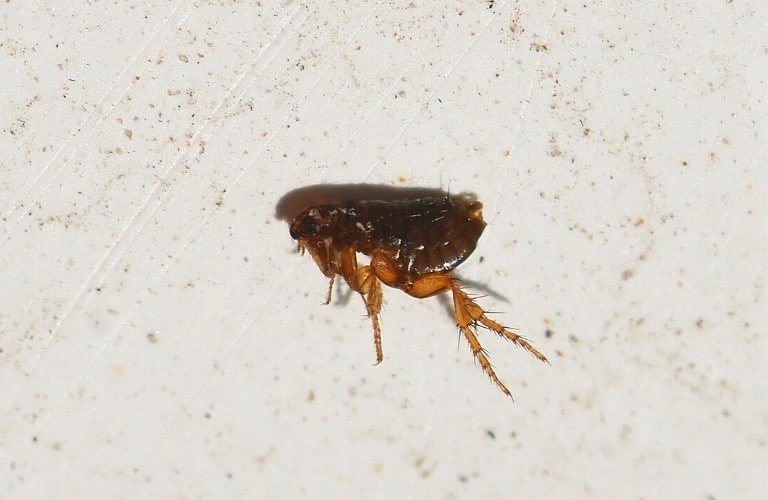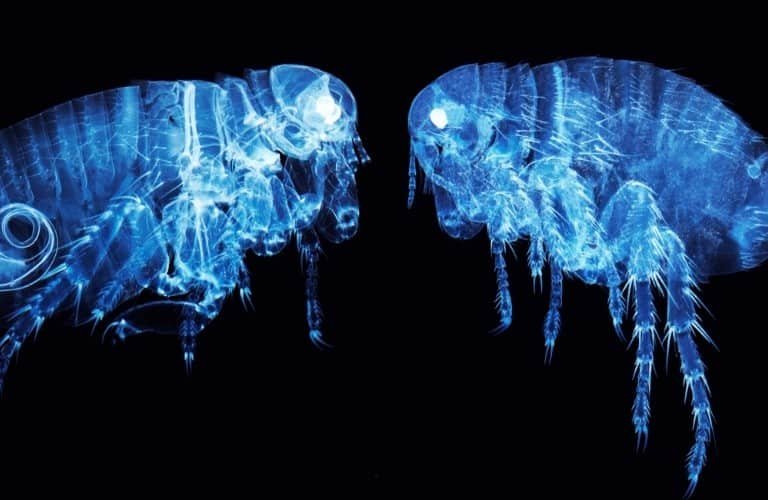There are many methods of flea control you can use that target different life stages of fleas.
You can repel or kill adults so they can’t lay eggs in the area, or you can use a spray or carpet powder to kill eggs and larva.
You should consider how long fleas spend in each stage before choosing a method.
How long do fleas live? Fleas can complete their entire life cycle in as little as a few weeks or live as long as two years. Their lifespan depends on the conditions of their environment and the availability of blood. The right conditions will speed up the developmental stages but will make adults live longer.
A good understanding of a flea’s life cycle will help you control them a little more easily. Continue reading to find out how long they live and how you can get rid of them.
Life Stages of a Flea
Fleas have four different stages they go through in their life: egg, larva, pupa, and adult. The first three stages are necessary for the development of the flea.
The adult flea spends its life finding food and shelter so they can reproduce prolifically.
A flea can complete its entire life cycle in as little as a month or up to two years. It depends on the availability of nutrients and ideal conditions during each stage.
During the egg, larval, and pupal stages, poor conditions will result in slower development. The adult, however, will live a shorter life.
Good conditions will make the egg hatch and larva and pupa develop quicker but will allow the flea to live for over a year.
Let’s take a closer look at each stage. A little bit of knowledge will go a long way when it comes to combatting fleas in your home.
Egg
A female flea can lay around 5,000 eggs in her lifetime, which is why they can multiply so quickly.
Some species of fleas will prefer to lay eggs on the ground while others will lay eggs on the host.
When they’re laid on the host, they tend to fall off. This is why pet bedding and carpets tend to have so many flea eggs.
In poor conditions, flea eggs can take up to two weeks to hatch. Eggs that are in perfect conditions can take as little as two days to hatch.
Larva
Once the eggs hatch, the fleas are in the form of larvae. They’ll stay in dark areas that are humid and feed on what’s around them.
They’ll eat almost anything, including manure, dry dog food, and flea eggs that don’t hatch.
Fleas will remain as larvae for 4-18 days before they turn into pupae. Similar to the eggs, a comfortable environment will result in faster development.
Pupa
Flea pupae are larvae that have formed a cocoon after fully developing in the larval stage.
In the pupal stage, they wait in their cocoon and molt inside until they’re fully developed and are ready to come out.
The way they know to come out is fascinating. The pupa has to be triggered by vibration, carbon dioxide, and heat.
If a host approaches an area, whether it’s you or your pet, the flea in the pupa can detect it by the three triggers.
They’ll emerge as adult fleas and will begin to search for the host so they can begin feeding on blood.
The pupa stage can be as little as four days or can last several months.
If humidity levels are too low or high or there’s no sign of a host, they can remain dormant in their cocoon until the conditions improve.
Adult
Adult fleas need blood to survive, which is why they spend most or all of their life on a single host.
Female fleas must have a blood meal before they can begin laying eggs. If a flea doesn’t have access to blood, it can die in just four days.
If they have a constant source of blood and the conditions are just right, fleas can live for over a year as adults.
Females will lay eggs throughout their entire life.
If a flea had a long development period before emerging as an adult but then found the right conditions to live in, it could very well survive for a total of two years.
Conditions Affect the Growth of Fleas
As previously mentioned, a flea’s life depends on the conditions it lives in.
If you want to prevent fleas in your home or need to combat an infestation, consider what encourages them and what kills them, and try to change your home accordingly.
Natural remedies and pesticides work well, but fleas won’t even stick around if the area isn’t sustainable.
Curious as to what the main cause of fleas is? Your first guess is probably right, but you can find the answer here.
The perfect conditions for a flea are:
- Dry: Puddles of water cause fleas to drown. Adult fleas can struggle to stay afloat, but they can’t swim. The developmental stages have no way of saving themselves.
- Slightly humid: Fleas need some moisture to develop. However, too much can also cause them harm. Humidity levels over 20% are enough to increase mortality rates in larvae.
- Dark: Fleas don’t like sunny areas, which is why you’ll frequently find them indoors or in covered areas outside. If you line your pet’s bed with a blanket, it will become a prime place for fleas to live.
- Protected: Fleas don’t like to be disturbed and want to avoid wind, so they’ll stay in places where they feel safe. This is why you’ll find them in tall grass or in the carpet underneath furniture.
How to Stop a Flea Infestation
You should begin treating your home and yard for fleas as soon as you spot one. If there’s one, there’s probably more.
If you’re certain that you have fleas residing within your carpets, head over to our article, “How to Get Rid of Fleas in Carpet” for a complete, detailed guide to eliminating them entirely.
Prevention Tips
You can start using prevention tips even after you’ve already spotted some fleas.
They can help eliminate the present population and prevent more from making your home theirs.
Vacuum
Vacuum your carpets and rugs regularly to remove fleas.
Whether they’re adults, eggs, or somewhere in between, they’ll get sucked out of the carpet.
Just be sure to empty the vacuum canister into an outdoor trash can.
Wash Pet Bedding
Pet bedding is a common breeding ground for fleas. Wash the bedding two or three times each month in hot water to kill any bugs that might be hiding.
Maintain the Landscape
Fleas don’t like the sun or unprotected areas, so trim your bushes and mow the grass to keep them out of the yard.
Don’t let debris or furniture sit in the same place for too long, especially in grass or dirt patches, or they’ll quickly become a new home for fleas.
(Are fleas more likely to infest lush grass, or do they prefer shaded, bare dirt patches? Find the answer here.)
Natural Methods
You don’t have to resort to pesticides if you don’t want to. There are plenty of natural options you can choose to combat fleas.
Fleas hate the scent of citrus. Boil the fruit in water, let it cool, and then pour it into a spray bottle.
Spray carpets, furniture, and your pet’s favorite places frequently to keep your home smelling fresh and to ward off the pests.
You can also make sprays with herbs and spices in a similar manner, or you can use dried herbs in a sachet or sprinkle around your home.
Fleas don’t like lavender, spearmint, or rosemary, so consider trying one of these.
Diatomaceous earth is a natural insect killer that you can sprinkle outside or on your carpets.
Adult fleas will die from dehydration a couple of days after they walk over the powder since it cuts their exoskeleton and removes moisture from their bodies.
Believe it or not, plain, ordinary salt will kill fleas in a similar fashion.
Pesticides
Sprays and carpet powders are almost guaranteed to get rid of your flea problem, but they’re not safe to use around people and pets.
You’ll need to stay out of the room for a while after applying the pesticide, and you risk causing children, pets, and yourself harm if there’s leftover residue that you can’t see.
We carefully evaluated over 15 different powders to kill fleas in carpets and narrowed it down to the seven most effective.
You can head over to “Best Flea Powder for Carpets” to see our top recommendations.
If you’d prefer a liquid pesticide instead, Enforcer Flea Spray is effective for up to seven months after application.
If you choose to use pesticides, use caution, and follow the directions of the product carefully. If all else fails, you can always call an exterminator.
Final Thoughts
Fleas can live up to two years, although it’s not too common. A flea will go through four stages in its lifetime. Each one will last a short period of time.
The pupa can last a few months, and the adult stage can be a year or longer.
Consider these lifespans along with what conditions fleas need to survive when you treat your home for fleas.
Totally eradicating these pests from your home and yard is well worth the effort.
You can find more information on elimination methods and helpful tips for prevention in our other flea articles.





